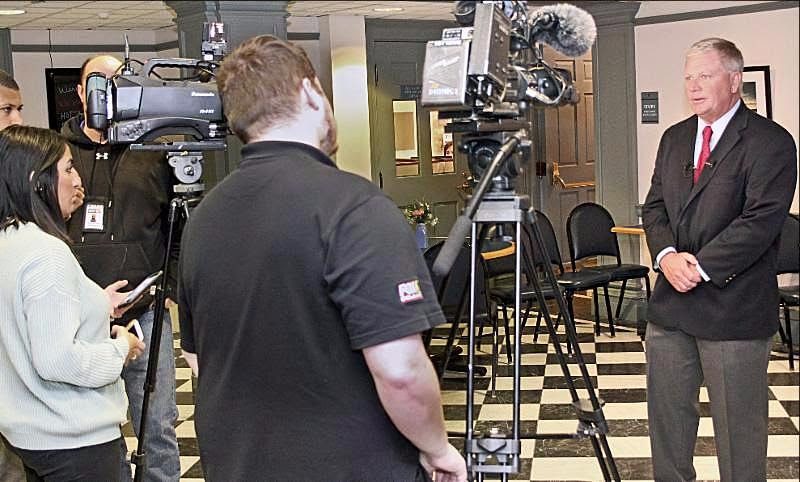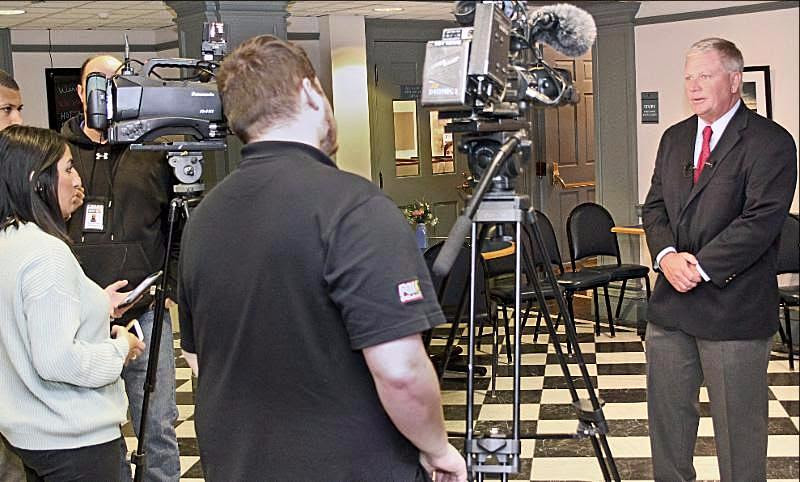Frustration and impatience were the themes of a press conference held by the head of the Correctional Officers Association of Delaware (COAD) at Legislative Hall Thursday afternoon.

“It breaks my heart to have to stand here today,” COAD President Geoff Klopp told reporters and a dozen legislators gathered for the event held in the Capitol’s cafeteria.
Nearly seven weeks following the February 1st hostage incident at the James T. Vaughn Correctional Center near Smyrna that resulted in the killing of Correctional Officer Lt. Steven Floyd, Mr. Klopp said the men and women charged with keeping the state’s prisons secure are in a crisis situation.
“Evidently, I have not done a good enough job to relate the severity of this situation,” he said, noting the issues of chronic short-staffing and forced overtime have only been worsened by dozens of retirements and resignations of prison staffers in the wake of Lt. Floyd’s murder.
Mr. Klopp lamented what he perceives as “a lack of action” on the part of the governor and state lawmakers. “We do have a tremendous amount of support inside this building (Legislative Hall), but right now I don’t need support, I need action.”
On Monday, Gov. John Carney pledged to add 50 correctional officers at James T. Vaughn Correctional Center and 25 correctional officers at the Baylor Women’s Correctional Institution in the upcoming budget the begins July 1st.
The governor also promised more than $1.5 million for new communications technology and other equipment to aid correctional officers. Most of the funding would also be in the proposed FY 2018 budget request.
Mr. Klopp was dismissive of the initiatives. “Seventy-five officers is not enough and, as for the equipment, I have no idea what that is,” he said. “We absolutely need 100 more correctional officers at James T. Vaughn alone.”
In a letter to lawmakers earlier in the week, COAD asked lawmakers to support a series of dramatic changes that included “a complete staffing overhaul” for all Department of Correction’s facilities; a new, higher salary structure for all correctional officers; and the establishment of a career ladder.
Under the proposal, annual starting wages for a new correctional officer would be $48,713 — a significant increase from the current $32,059 base salary.
While the current contract under which the union is operating will not expire until June 30, 2018, state law calls for a new contract to be in place by the start of this December.
“A compensation package needs to be passed and it needs to be funded,” Mr. Klopp said.
While state law bars correctional officers from staging a strike or other job action, Mr. Klopp said his members’ willingness to accept voluntarily overtime could come into play.
Even if the union received everything it is seeking, Mr. Klopp conceded the hiring and training process would delay the arrival of any new correctional officers for at least four months. Still, he said fast action would send a strong message to his members that help was on the way.
“I understand the frustration,” said State Rep. Steve Smyk, R-Lewes-Milton, who has been an outspoken correctional officers’ advocate since first taking office in 2014. “The State of Delaware is at least 100 correctional officers below authorized strength and we continue to lose more with each passing week. These staffing and compensation issues have persisted for years and it’s only the tragic, violent death of Lt. Floyd that has given them the attention they have always deserved.”
Speaking during a live interview on radio Friday morning, Mr. Klopp predicted unless action was forthcoming, another catastrophic incident would likely occur in the state prison system before the end of the summer.
Source: Delaware State House of Representatives, Minority Caucus
Image Credits: Minority Caucus

